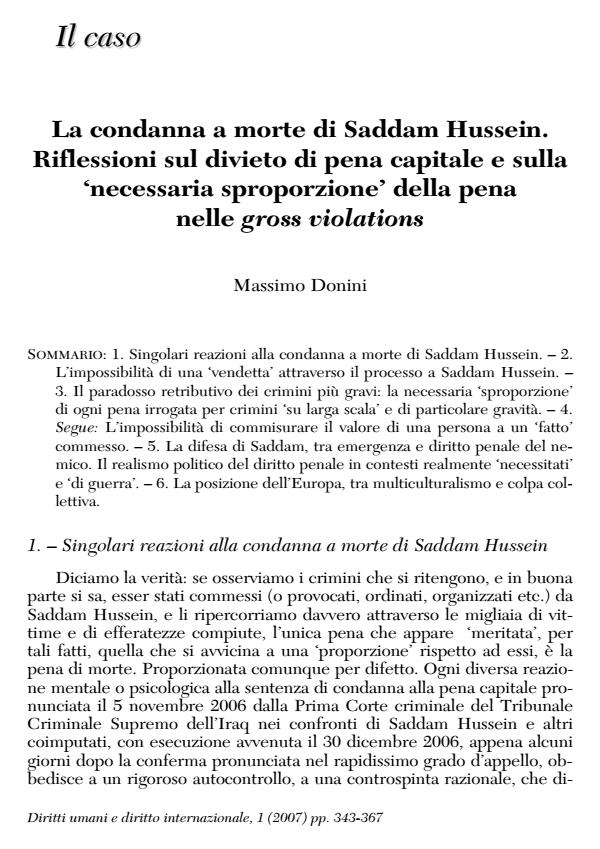La condanna a morte di Saddam Hussein. Riflessioni sul divieto di pena capitale e sulla "necessaria sproporzione" della pena nelle gross violations
Journal title DIRITTI UMANI E DIRITTO INTERNAZIONALE
Author/s Massimo Donini
Publishing Year 2007 Issue 2007/2
Language Italian Pages 25 P. 343-367 File size 183 KB
DOI
DOI is like a bar code for intellectual property: to have more infomation
click here
Below, you can see the article first page
If you want to buy this article in PDF format, you can do it, following the instructions to buy download credits

FrancoAngeli is member of Publishers International Linking Association, Inc (PILA), a not-for-profit association which run the CrossRef service enabling links to and from online scholarly content.
The death sentence of Saddam Hussein is one of those extreme cases that put in tension the foundations of the absolute prohibition of the capital punishment, still more in the moment in which we think to extend its capacity in a universal sense and the fact that numerous States (Arabic Countries, China, United States, Japan, etc.) maintain it, comprised therefore western or liberal political systems, and not only authoritarian or religious political systems: the compact exclusion of Europe from that group moreover regards an entity that has financed yearlong Saddam, giving him enormous amounts of war materials, also chemical, thanks which were realized the genocides that he was charged with, included the crime of the 148 died of Dujail (apart from the tortured ones, deported etc.), killed for reprisal after his assassination attempt, and on which the criminal trial has condemned him has been focused. Looking through the accusations and the numerous violations of the defensive guarantees of the process, moreover it is pointed out that the trial of Saddam Hussein has been an effective process, not like the ghost-trial that in 1984 the Iraq Revolutionary Court celebrated in order to condemn to death penalty 148 men, women and children, suspected opponents of the regimen, 46 of which already were died at that time for the tortures or other causes. The vastness of the ascribed crimes to Saddam could not know a proportioned penalty in any case, therefore the punishment in the gross violations of the international criminal law is necessarily out of proportion. In this necessary disproportion we can identify a possible humanistic valence of the criminal law based on the principle (able to renew the foundation of the absolute prohibition of capital punishment) today summarized in the idea that the value of a person cannot be compared with whichever fact he/she committed, because the value of the person is not entirely expressed by the single facts she realizes. The proportion judgment on which the capital punishment is based, results then impossible between one person (his life) and the committed facts. On such positive principle of unmeasurability of the distance between the value of a person and his conducts, we may refuse the capital punishment as a typical penalty of the criminal law of the enemy. Humanistic and religious reflections converge on this conclusion, in a multicultural dimension, which is more positive than a merely secular point of view. The criminal law culture can today carry out a task of singular importance if it indeed agrees to assert the absoluteness of that prohibition, avoiding the church of the western (United States) and of the oriental fundamentalisms, and remarking, from a European point of view, the human corresponsibility on which the refusal of death penalty is based.
Massimo Donini, La condanna a morte di Saddam Hussein. Riflessioni sul divieto di pena capitale e sulla "necessaria sproporzione" della pena nelle <em>gross violations</em> in "DIRITTI UMANI E DIRITTO INTERNAZIONALE" 2/2007, pp 343-367, DOI: